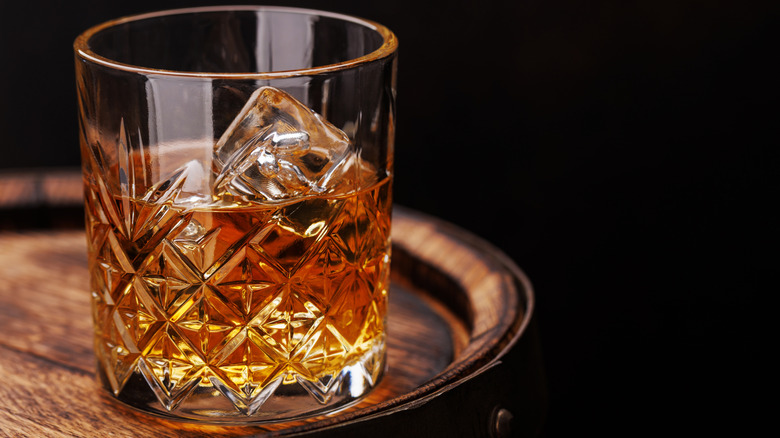Toning Down Whiskey's Bitterness Only Takes A Simple Pantry Staple
Although essentially just distilled grain aged in a barrel, whiskey enthralls with its wide array of flavors. Yet with so many whiskey types in existence, not all may delight upon the first sip. Every so often, you get a glass with an unpalatable bitterness, thereby overriding any enjoyment. Thankfully, though, this isn't an outright sign to abandon the bottle; just a simple dash of sugar can tone down the spirit's bitterness.
For help in explaining the interaction, as well as diving into the methods of mixing sugar and whiskey together, Food Republic is fortunate for the exclusive help of David Orellana. As the Beverage Director at Grand Brasserie in New York City, Orellana certainly knows the intricacies of the spirit. Although the combination involves only two ingredients, there is abundant complexity to unpack.
Firstly, it's helpful to understand what's responsible for whiskey's bitterness. Orellana breaks down that the "oak tannins, rye spice, and phenolics" (compounds usually derived from peat) contribute to the spirit's off-putting taste. Sugar works to directly counteract such a flavor through a process Orellana refers to as "Mixture Suppression" — thus making the bitterness less perceptible, but not overridden completely. Furthermore, the sugar imparts a gentle textural effect as it "makes the whiskey feel a bit rounder and fuller on the palate," adds Orellana. While only a minimal amount of the sweetener goes into the glass, the sugar makes quite an impact.
Mix simple syrup into whiskey to reduce bitterness
Whether prepared into a classic Old Fashioned or enjoyed as a whiskey and Coke, enjoying the spirit with a sweet ingredient is nothing new. However, using a measured quantity of sugar to target specifically bitterness is a different approach that entails its own meticulous precision. You'll need to do more than simply sprinkling the sweetener into the glass; Orellana notes granulated sugar is "gritty and inconsistent unless you make it into syrup." Instead, use a 1:1 ratio of simple syrup or a 2:1 rich demerara syrup. The former offers a polished composition that won't overwhelm the spirit, while the latter is more sugary, but with a "gentle molasses note that flatters bourbon and many ryes," says Orellana.
Accordingly, you'll also need to consider the quantity. The precise amount depends on the bitterness of the whiskey on hand as well as your taste preferences, but remain cautious, as over-sweetening is a common mistake. Too much sugar eliminates the whiskey's nuance, so Orellana cites that "for a 2-ounce (60-milliliter) pour, using ½–1 teaspoon (2–5 milliliters) simple syrup," results in ideal bitterness suppression.
Incorporate a few drops at a time, sample, and then reassess, checking for the whiskey's nuance to shine. If you happen to add too much, Orellana recommends to " split the glass and top with unsweetened whiskey," or throw some bitters in the mix. The next time you need to tone a whiskey shot, a splash of sugar works wonders.


